|
|
|
Sort Order |
|
|
|
Items / Page
|
|
|
|
|
|
|
| Srl | Item |
| 1 |
ID:
093234
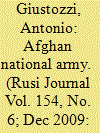

|
|
|
|
|
| Publication |
2009.
|
| Summary/Abstract |
Billions of dollars have been spent in training, mentoring and equipping a new Afghan army which is representative of Afghanistan's diverse ethnic groups and operates in the nation's interests. Yet, at the end of 2009, the Afghan Army is beset by a host of problems including widespread illiteracy, ethnic rivalries, drug use and poor combat effectiveness. Respected Afghan expert Antonio Giustozzi analyses what has gone wrong and suggests that a new model may be the only way forward.
|
|
|
|
|
|
|
|
|
|
|
|
|
|
|
|
| 2 |
ID:
189729


|
|
|
|
|
| Summary/Abstract |
Antonio Giustozzi intervenes in the debate of how close the Taliban and Al-Qa’ida have been, examining the political economy of their relationship. There is clear evidence of considerable friction between the two organisations over the years, which makes more recent claims of worsening tension by oral sources plausible, given also the signature of the US–Taliban agreement in 2020 and clear divergence over the emirate’s relations with the UN and regional countries.
|
|
|
|
|
|
|
|
|
|
|
|
|
|
|
|
| 3 |
ID:
077137
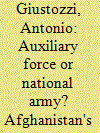

|
|
|
|
|
| Publication |
2007.
|
| Summary/Abstract |
Afghanistan's fifth effort to form a central army started in 2002, following the fall of the Taleban regime. Mainly run by the US armed forces, the formation of the so-called 'Afghan National Army' run into several difficulties, ranging from initially slow recruitment, low educational level of troops and officers, high attrition rates. As the new army began to take shape, it lacked many of the characteristics which had been associated by the promoters with a 'national' army. It also showed a low level of commitment and a lax discipline. As of 2006, it looked more like an auxiliary force at the service of the US army and its allies than like a 'national' army.
|
|
|
|
|
|
|
|
|
|
|
|
|
|
|
|
| 4 |
ID:
158973


|
|
|
|
|
| Summary/Abstract |
Central Asians have long been present within the ranks of organisations linked to the global jihad movement, but has there been an acceleration in their recruitment in recent years? There is growing evidence of substantial numbers of Central Asians (mostly Uzbeks and Tajiks) present in Syria in the ranks of the Islamic State and of a number of organisations linked to Al-Qaida. There is also growing evidence of recruitment inside Kyrgizstan and Tajikistan at least (as opposed as among Central Asian emigrants). The authors argue that distrust towards information provided by the Central Asian regimes should not blind analysts towards an emerging trend, which has substantial destabilising potential. The factors driving this recruitment also seem to be much more complex than a rejection of the authoritarianism of the ruling elites.
|
|
|
|
|
|
|
|
|
|
|
|
|
|
|
|
| 5 |
ID:
087680
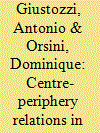

|
|
|
|
|
| Publication |
2009.
|
| Summary/Abstract |
The article offers a review of centre-periphery relations and local politics in the Afghan province of Badakhshan from the 1980s to the post-2001 era. It maps the local powerbrokers and charts the transformations that occurred during this period, with particular reference to the impact of the central government's policies on local political alignments and relations of power. The key argument is that President Karzai's and the cabinet's behaviour towards Badakhshani politics was aimed at re-establishing a patrimonial system, rather than at institution-building as claimed. Unable or unwilling to successfully deal with established local players, Kabul resorted to sponsoring new players in local politics and facilitating their rise in order to weaken more independent powerbrokers. However, a local perception of weakness in Kabul, not least due to uncertainty over the durability of the Karzai administration, led local players, old and new, to behave with very short-term horizons, as 'roving bandits' rather than as 'stationary' ones.
|
|
|
|
|
|
|
|
|
|
|
|
|
|
|
|
| 6 |
ID:
152015
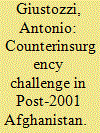

|
|
|
|
|
| Summary/Abstract |
Although the Taliban insurgency was internally divided and unable to coordinate its activities in 2014–2015, the Afghan security forces were not able to contain it and steadily lost ground throughout 2015. Until 2015, there had been little effort to develop an indigenous Afghan counterinsurgency strategy, but a sense of urgency emerged after a string of Taliban victories. At the beginning of 2016, it was still not clear if and when the National Unity Government would be able to produce a counterinsurgency strategy and, in any case, the need for a coherent counterinsurgency approach became questionable as the Taliban appeared to be transitioning towards conventional warfare.
|
|
|
|
|
|
|
|
|
|
|
|
|
|
|
|
| 7 |
ID:
099984
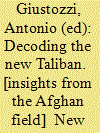

|
|
|
|
|
| Publication |
New Delhi, foundation Books, 2009.
|
| Description |
xiii, 318p.
|
| Standard Number |
9781850659617, hbk
|
|
|
|
|
|
|
|
|
|
|
|
Copies: C:1/I:0,R:0,Q:0
Circulation
| Accession# | Call# | Current Location | Status | Policy | Location |
| 055459 | 320.9581/GIU 055459 | Main | On Shelf | General | |
|
|
|
|
| 8 |
ID:
051993


|
|
|
| 9 |
ID:
051994


|
|
|
| 10 |
ID:
080404


|
|
|
|
|
| Publication |
2007.
|
| Summary/Abstract |
Afghan tribes and local communities have been exposed to foreign patronage since at least the 19th century, but the scale of patronage relative to Afghanistan's internal economy increased dramatically after the late 1970s. Inevitably, this had a major impact on Afghanistan's own internal dynamics and on the mechanisms of political legitimisation. This article focuses on the province of Kandahar, which occupies a privileged space in Afghan politics and history, having given origin to almost all of the country's ruling elites. It deals with three groups of tribal strongmen, who tried to use tribally based patronage systems to stake a claim to local power.
|
|
|
|
|
|
|
|
|
|
|
|
|
|
|
|
| 11 |
ID:
080356


|
|
|
|
|
| Publication |
London, Hurst & Company, 2007.
|
| Description |
xv, 259p.
|
| Standard Number |
9781850658726
|
|
|
|
|
|
|
|
|
|
|
|
Copies: C:1/I:0,R:0,Q:0
Circulation
| Accession# | Call# | Current Location | Status | Policy | Location |
| 053094 | 355.021809581/GIU 053094 | Main | On Shelf | General | |
|
|
|
|
| 12 |
ID:
124150
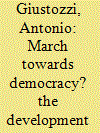

|
|
|
|
|
| Publication |
2013.
|
| Summary/Abstract |
Although the post-2001 period in Afghanistan has been hailed as a return to an earlier process of democratic opening that was interrupted in the early 1970s, a comparison of the development of political movements up to 1978 and then after 2001 highlights important differences. Until the late 1960s, Afghan political parties were mainly focused on influencing a supposedly enlightened leadership towards faster modernization of the country. Their disillusion was beginning to push them towards the development of forms of organization which could mobilize sections of the population on their behalf, even if tentatively so. Little comparable effort was noticeable after 2001, when parties big and small, seemed intent mainly on securing a position from which to develop a following based on the distribution of patronage. It could be argued that the availability of resources on a large scale following international intervention in 2001 drove the Afghan political system in a direction quite different from the path which was initially embarked upon in the 1960s.
|
|
|
|
|
|
|
|
|
|
|
|
|
|
|
|
| 13 |
ID:
098887
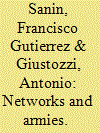

|
|
|
|
|
| Publication |
2010.
|
| Summary/Abstract |
Until recently, the importance of organizational factors in the understanding of the variance of the behavior of state challengers had not been recognized. New studies and theories have underscored its crucial character. This article contends that challengers can be placed in a continuum constituted by two opposed polar types, army like and network associations, and compare the Afghan Taliban's and the Colombian Fuerzas Armadas Revolucionarias de Colombia (Revolutionary Armed Forces of Colombia-FARC)'s organizational principles from this point of view. The main claim is that organizationally inspired explanations behave much better than resource inspired ones when accounting for the differences between the Taliban and the FARC.
|
|
|
|
|
|
|
|
|
|
|
|
|
|
|
|
| 14 |
ID:
149710
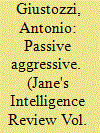

|
|
|
|
|
| Summary/Abstract |
Jihadist groups in Afghanistan and Pakistan have experienced leadership turnover and are contending with the emergence of the Islamic State in the region. Antonio Giustozzi assesses the balance of power between militant groups in the borderlands.
|
|
|
|
|
|
|
|
|
|
|
|
|
|
|
|
| 15 |
ID:
136364


|
|
|
|
|
| Summary/Abstract |
Taliban commander Mullah Zakir was promoted rapidly to a position of seniority within the group before precipitously falling from grace. From Afghanistan, Antonio Giustozzi provides a unique insight into the nature of the group’s senior leadership structures.
|
|
|
|
|
|
|
|
|
|
|
|
|
|
|
|
| 16 |
ID:
179833
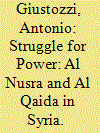

|
|
|
|
|
| Summary/Abstract |
Relying on interviews with members of the organization, the article argues (contrary to the prevailing view) that Al Nusra never split from Al Qaida and even more so from the global jihadist movement. Instead the leadership of Al Nusra was locked in a power struggle with Al Qaida over the control of jihad in Syria and possibly even over the future of Al Qaida itself. Efforts to unify the Syrian opposition, even those limited to jihadist groups, failed also because of the leadership of Al Nusra kept trying to co-opt other opposition groups, rather than forming alliances with them.
|
|
|
|
|
|
|
|
|
|
|
|
|
|
|
|
| 17 |
ID:
123982
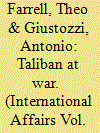

|
|
|
|
|
| Publication |
2013.
|
| Summary/Abstract |
In seeking to explain why and how the war in Afghanistan has dragged on, most analysis has focused on the western and Afghan government effort. This article examines how the war looks from the perspective of the insurgency. Using Helmand province as a case-study, the authors draw on a large number of original interviews with Taliban field commanders and fighters to produce a uniquely detailed picture of the Taliban at war.
In the first section, the article explores how the Taliban returned to Helmand from 2004 to 2006, and show how the British made the situation far worse when they deployed forces to Helmand in 2006. In the second part of the article the authors examine the evolution of the Taliban insurgency in Helmand since 2006. They show how the Taliban has developed an increasingly centralized organizational structure, a more militarized shadow government and greater professionalism of field units.
The overall picture that emerges is of a resilient insurgency that has adapted under immense military pressure. The Taliban have suffered very heavy attrition in Helmand, but they are far from defeated.
|
|
|
|
|
|
|
|
|
|
|
|
|
|
|
|
| 18 |
ID:
131977
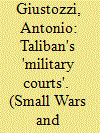

|
|
|
|
|
| Publication |
2014.
|
| Summary/Abstract |
The Taliban's 'code of conduct', which lists rules of discipline for the fighters, has been widely discussed, but do the Taliban try to implement it? This article discusses the structures that the Taliban have put in place for this purpose and their evolution over the years. It assesses that while the Taliban's 'military justice' system is still work in progress, the fact that it has attracted a significant investment in human resources bears witness to a serious intent of the leadership. However, the Taliban's concern with the behaviour of their fighting force is driven by their own political calculus, not by any sympathy for the international law of conflict.
|
|
|
|
|
|
|
|
|
|
|
|
|
|
|
|
| 19 |
ID:
176272
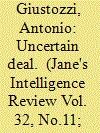

|
|
|
| 20 |
ID:
077181
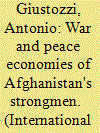

|
|
|
|
|
| Publication |
2007.
|
| Summary/Abstract |
Afghanistan's war economy started taking its current shape after 1992, when the main politico-military actors had to find alternative sources of revenue, having been dropped by their international sponsors. The same actors integrated into the 'peace economy' following the official end to the war in 2001, in a process which resembles the formation of 'mafia' networks, in which the narcotics trade appears to play an important role. If the central government turns out to be too corrupt and uncommitted to address the issue, the international community might one day have to directly engage these actors in order to facilitate their evolution from 'robber barons' to legitimate magnates
|
|
|
|
|
|
|
|
|
|
|
|
|
|
|
|
|
|
|
|
|